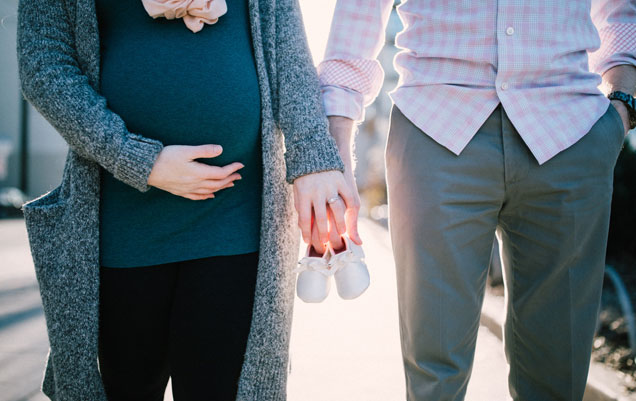
There are plenty of things that get better with age: fine wine (if you are patient), your favorite pair of jeans (worn in just right), your 401K (hopefully), and – some might say – George Clooney (he’s just rocking that salt-n-pepper thing).
But sadly, the passing of years takes its toll on a host of casualties, including your forehead, iPhone battery life and – like it or not – your ability to have a baby (and guys, it’s not just the ladies).
And while there’s always Botox and a quick trip to the Apple store to remedy some of those issues, there’s not much to be done when it comes to reversing the passage of time on your reproductive health.
“In general, maternal and paternal age do impact fertility rates and after age 40, fertility rates decline,” Thomas L. Toth, M.D., a reproductive endocrinologist at Boston IVF and an associate professor of obstetrics, gynecology, and reproductive biology at Harvard Medical School, told SELF. “However, it appears that the decline is not nearly as significant in the male patient as the female patient.”
Ladies, First
Although fertility declines with age in both men and women, according to the National Institute of Health, the effects of aging is much greater in women, who are half as fertile in their 30s as they were in their 20s. Age 35 seems to be the demarcation line when a woman’s chances of conception begin to decline significantly.
Here’s the biggest impediment to women conceiving successfully as they get older: their eggs are ageing right along with them. ICYMI, healthy baby girls might not be born with a full set of teeth, but they do arrive with all the eggs they’re ever going to produce, nestled deep inside their teeny baby ovaries. Fun fact: that number actually peaks at about 20 weeks of life (whoa, baby!) and decreases from there.
“The number of eggs at birth is about 1-2 million, which further reduces to 300,000 at puberty,” Dr. Nigel Pereira, MD, FACOG, ALS/ELS (AAB), Assistant Professor of Obstetrics and Gynecology and Assistant Professor of Reproductive Medicine at the Ronald O. Perelman and Claudia Cohen Center for Reproductive Medicine told Brides.com. “The number of eggs available decreases precipitously until the onset of menopause. Most women ovulate approximately 400-500 in their entire life.”
By the time a woman celebrates her 40th birthday, her chances of getting pregnant have fallen by half and her risk for miscarriage is greater than a healthy birth.
As women age, the quality of their existing eggs is also affected by factors like fever, sickness and environmental toxins, helping to contribute to possible lower chances of fertilization and the ability of a fertilized egg to successfully implant in the uterus. If fertilization is successful, chances greatly increase for miscarriage, birth defects and chromosomal abnormalities. Ouch.
But here’s some good news: scientists are working on a way to use stem cells to help generate new eggs that could develop into offspring. But don’t get too excited; right now testing is limited to mice, so we are years away from trying it out on humans.
Gentlemen, take your mark
Unlike the ladies, dudes are constantly regenerating their baby making ingredients (hint: sperm), Jennifer Hirshfeld-Cytron, M.D., director of fertility preservation at Fertility Centers of Illinois, told SELF. However, she pointed out, over time not only can there be a reduction in the quantity of sperm present in the semen, but the shape and motility (ability to get around) of the sperm decreases continually starting at age 20 until about 80.
“Wait a minute,” you’re thinking, “John Stamos is 54 and his guys were able to make a baby and George Clooney may be a bit of a silver fox, but that stud fathered twins. And, hello, Alec Baldwin is still a baby-making machine!”
We know, the odds seem to be working ever in those famous guys’ favor.
While it usually only takes about 4.5 months for a man under 25 to get his partner pregnant, guys over 40 generally have to wait 2 years for similar results (and that’s when the mother-to-be is 25). For guys over 45, that rate increases by 5 percent and the risk of miscarriage is about twice as high.
Also, genetic changes could affect men after 45 and recent studies found small increases in the likelihood of having a baby that goes on to develop autism, bipolar disorder, or psychosis as paternal age goes up.
If you and your partner have decided to have a baby at an older age, one of your first steps is to assess your fertility. SpermCheck is an over-the-counter male fertility test that measures your sperm count and is a lot easier – and more private – than a trip to a clinic to provide a sperm sample.
“Women/couples should ideally prepare themselves mentally and physically at least 4-6 months before attempting to conceive,” said Dr. Pereira. “A healthy diet, prenatal vitamins/folic acid and regular exercise is recommended. Smoking cessation is imperative. Alcohol consumption should be none-to-minimal.”
He added that couples over 35 who haven’t conceived within 6 months of actively trying should consider seeking out a fertility specialist.



